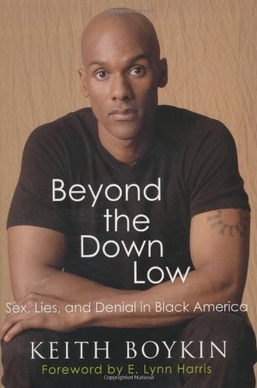Related Research Articles

Sexual orientation is an enduring personal pattern of romantic attraction or sexual attraction to persons of the opposite sex or gender, the same sex or gender, or to both sexes or more than one gender. Patterns are generally categorized under heterosexuality, homosexuality, and bisexuality, while asexuality is sometimes identified as the fourth category.

The AIDS epidemic, caused by HIV, found its way to the United States between the 1970s and 1980s, but was first noticed after doctors discovered clusters of Kaposi's sarcoma and pneumocystis pneumonia in homosexual men in Los Angeles, New York City, and San Francisco in 1981. Treatment of HIV/AIDS is primarily via the use of multiple antiretroviral drugs, and education programs to help people avoid infection.

The Kinsey scale, also called the Heterosexual–Homosexual Rating Scale, is used in research to describe a person's sexual orientation based on one's experience or response at a given time. The scale typically ranges from 0, meaning exclusively heterosexual, to a 6, meaning exclusively homosexual. In both the male and female volumes of the Kinsey Reports, an additional grade, listed as "X", indicated "no socio-sexual contacts or reactions" (asexuality). The reports were first published in Sexual Behavior in the Human Male (1948) by Alfred Kinsey, Wardell Pomeroy, and others, and were also prominent in the complementary work Sexual Behavior in the Human Female (1953).

Biphobia is aversion toward bisexuality or people who are identified or perceived as being bisexual. Similarly to homophobia, it refers to hatred and prejudice specifically against those identified or perceived as being in the bisexual community. It can take the form of denial that bisexuality is a genuine sexual orientation, or of negative stereotypes about people who are bisexual. Other forms of biphobia include bisexual erasure.

The field of psychology has extensively studied homosexuality as a human sexual orientation. The American Psychiatric Association listed homosexuality in the Diagnostic and Statistical Manual of Mental Disorders (DSM) in 1952, but that classification came under scrutiny in research funded by the National Institute of Mental Health. That research and subsequent studies consistently failed to produce any empirical or scientific basis for regarding homosexuality as anything other than a natural and normal sexual orientation that is a healthy and positive expression of human sexuality. As a result of this scientific research, the American Psychiatric Association declassified homosexuality as a mental disorder in 1973. Upon a thorough review of the scientific data, the American Psychological Association followed in 1975 and also called on all mental health professionals to take the lead in "removing the stigma of mental illness that has long been associated" with homosexuality. In 1993, the National Association of Social Workers adopted the same position as the American Psychiatric Association and the American Psychological Association, in recognition of scientific evidence. The World Health Organization, which listed homosexuality in the ICD-9 in 1977, removed homosexuality from the ICD-10 which was endorsed by the 43rd World Health Assembly on 17 May 1990.
Down-low is a slang term that typically refers to a sexual subculture of men who usually identify as heterosexual but actively seek sexual encounters and relations with other men, and practice gay cruising. They generally avoid disclosing their same-sex sexual activities, even if they have female sexual partner(s), they are married to a woman, or they are single. The term is also used to refer to a related sexual identity. Down-low has been viewed as "a type of impression management that some of the informants use to present themselves in a manner that is consistent with perceived norms about masculine attribute, attitudes, and behavior". Although the term has its origins in African-American slang, it has since expanded to all races.-

Dean Hamer is an American geneticist, author, and filmmaker. He is known for his research on the role of genetics in sexual orientation and for a series of popular books and films that have changed scientific and public understandings and perceptions of human sexuality and gender.

Sexual attraction to transgender people has been the subject of scientific study and social commentary. Psychologists have researched sexual attraction toward trans women, trans men, cross dressers, non-binary people, and a combination of these. Publications in the field of transgender studies have investigated the attraction transgender individuals can feel for each other. The people who feel this attraction to transgender people name their attraction in different ways.

Beyond the Down Low: Sex, Lies and Denial in Black America is a 2005 nonfiction book by Keith Boykin.

Sexuality in transgender individuals encompasses all the issues of sexuality of other groups, including establishing a sexual identity, learning to deal with one's sexual needs, and finding a partner, but may be complicated by issues of gender dysphoria, side effects of surgery, physiological and emotional effects of hormone replacement therapy, psychological aspects of expressing sexuality after medical transition, or social aspects of expressing their gender.

The questioning of one's sexual orientation, sexual identity, gender, or all three is a process of exploration by people who may be unsure, still exploring, or concerned about applying a social label to themselves for various reasons. The letter "Q" is sometimes added to the end of the acronym LGBT ; the "Q" can refer to either queer or questioning.
Various topics in medicine relate particularly to the health of lesbian, gay, bisexual, transgender, queer, intersex and asexual (LGBTQIA) individuals as well as other sexual and gender minorities. According to the US National LGBTQIA+ Health Education Center, these areas include sexual and reproductive health, mental health, substance use disorders, HIV/AIDS, HIV-related cancers, intimate partner violence, issues surrounding marriage and family recognition, breast and cervical cancer, inequities in healthcare and access to care. In medicine, various nomenclature, including variants of the acronym LGBTQIA+, are used as an umbrella term to refer to individuals who are non-heterosexual, non-heteroromantic, or non-cis gendered. Specific groups within this community have their own distinct health concerns, however are often grouped together in research and discussions. This is primarily because these sexual and gender minorities groups share the effects of stigmatization based on their gender identity or expression, and/or sexual orientation or affection orientation. Furthermore there are subpopulations among LGBTQIA+ groups based on factors such as race, ethnicity, socioeconomic status, geographic location, and age, all of which can impact healthcare outcomes.

Bisexuality is a romantic or sexual attraction or behavior toward both males and females, to more than one gender, or to both people of the same gender and different genders. It may also be defined to include romantic or sexual attraction to people regardless of their sex or gender identity, which is also known as pansexuality.
Joe Kort is an American psychotherapist, clinical social worker, board-certified clinical sexologist, author, lecturer and facilitator of therapeutic workshops. He works as Clinical Director and founder of The Center for Relationship and Sexual Health in Royal Oak, Michigan.

LGBT sex education is a sex education program within a school, university, or community center that addresses the sexual health needs of LGBT people.
Discrimination against people with HIV/AIDS or serophobia is the prejudice, fear, rejection, and stigmatization of people with HIV/AIDS. Marginalized, at-risk groups such as members of the LGBTQ+ community, intravenous drug users, and sex workers are most vulnerable to facing HIV/AIDS discrimination. The consequences of societal stigma against PLHIV are quite severe, as HIV/AIDS discrimination actively hinders access to HIV/AIDS screening and care around the world. Moreover, these negative stigmas become used against members of the LGBTQ+ community in the form of stereotypes held by physicians.

On the Down Low: A Journey Into the Lives of Straight Black Men Who Sleep with Men is a 2004 New York Times Bestselling non-fiction book by J. L. King. The book was released in hardback on April 14, 2004, through Broadway Books and details the sexual lives of African-American men who are on the "down low" or having sex with men while posing or identifying as heterosexual. When the book was initially released, King denied claims that he was gay in both the book and in the media, but later confirmed that he was gay in 2010.
Since reports of emergence and spread of the human immunodeficiency virus (HIV) in the United States between the 1970s and 1980s, the HIV/AIDS epidemic has frequently been linked to gay, bisexual, and other men who have sex with men (MSM) by epidemiologists and medical professionals. It was first noticed after doctors discovered clusters of Kaposi's sarcoma and pneumocystis pneumonia in homosexual men in Los Angeles, New York City, and San Francisco in 1981. The first official report on the virus was published by the Center for Disease Control (CDC) on June 5, 1981, and detailed the cases of five young gay men who were hospitalized with serious infections. A month later, The New York Times reported that 41 homosexuals had been diagnosed with Kaposi's sarcoma, and eight had died less than 24 months after the diagnosis was made.
Homophobia in ethnic minority communities is any negative prejudice or form of discrimination in ethnic minority communities worldwide towards people who identify as–or are perceived as being–lesbian, gay, bisexual or transgender (LGBT), known as homophobia. This may be expressed as antipathy, contempt, prejudice, aversion, hatred, irrational fear, and is sometimes related to religious beliefs. A 2006 study by the Joseph Rowntree Foundation in the UK found that while religion can have a positive function in many LGB Black and Minority Ethnic (BME) communities, it can also play a role in supporting homophobia.

The African-American LGBT community, otherwise referred to as the Black American LGBT community, is part of the overall LGBT culture and overall African-American culture. The initialism LGBT stands for lesbian, gay, bisexual, and transgender.
References
- ↑ Kelly Jasper (12 November 2010). "Author wants to stop spread of HIV/AIDS". Augusta Chronicle . Retrieved 6 February 2011.
- ↑ Random House
- ↑ Alternet.org
- ↑ "Terry McMillan's Epilogue to 'Groove' Affair". The Washington Post . Archived from the original on 2020-10-09.
- ↑ Washington Post
- ↑ Books.google.com
- ↑ Findarticles.com
- ↑ Oprah.com